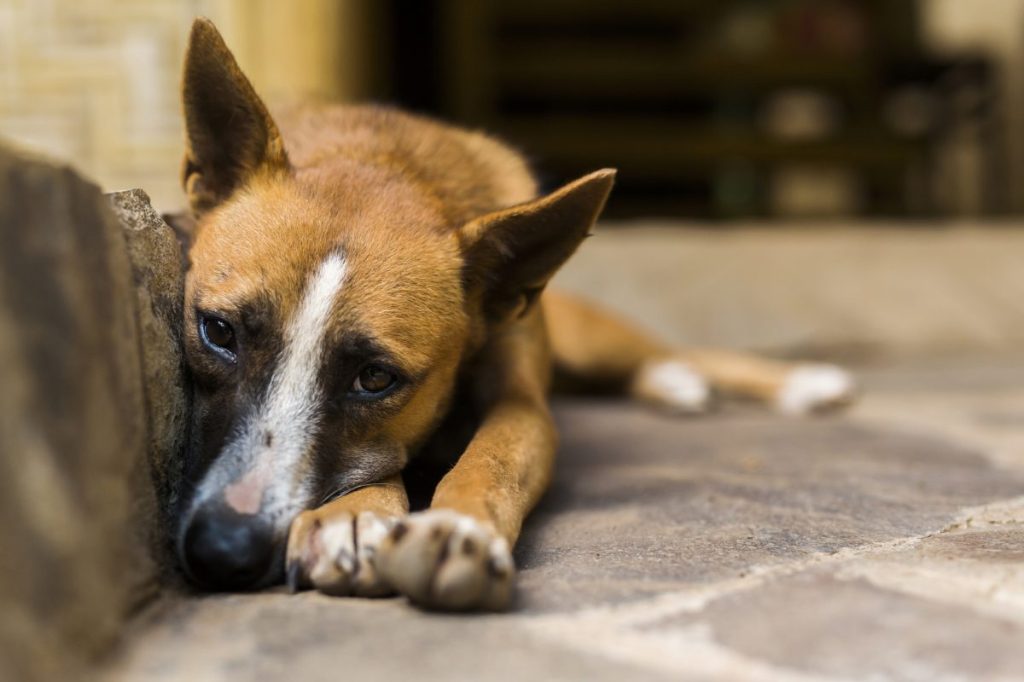We’ve all felt our hearts break over stories of animal abuse: those single, violent, and senseless acts of cruelty against animals. While neglect may not seem as brutal, failure to provide basic care for an animal can be just as devastating. Severe neglect can mean extended periods of extreme suffering resulting in permanent injury or even death. Dogs can’t speak up for themselves when humans are mistreating them, so it’s important to step up if you suspect a problem. Here’s how to spot the signs of a neglected dog, and what you can do about it.
Signs of a neglected dog
How do you spot a neglected animal? Some signs are too obvious to miss, and there’s often a pattern.
Is the dog skinny to the point of looking malnourished? Dirty, tangled, and matted fur can indicate that a dog doesn’t get even the most basic grooming care.
Animals who cower in fear when their human approaches are likely victims of abuse. But pets who are neglected may be regularly left alone without food or water. Their humans often chain them in a yard.
Some pets are even abandoned. Their humans simply move away and leave them behind, so neighbors might hear them howling and crying.
Hoarding animals is another form of neglect. Some people keep more animals — usually cats, but sometimes dogs — than they could possibly care for adequately.
A person who takes in far more animals than they can care for may have done so initially with the best of intentions. But they become overwhelmed and virtually blind to the suffering these animals live with daily.
Other signs of neglect include untreated tick or flea infestations, wounds on the body, limping, and patches of missing hair.
What happens to neglected dogs
Dogs who get hit by a car or suffer an injury without receiving medical treatment are suffering from neglect. So are animals kept outside without adequate shelter in extreme weather.
In frigid temperatures, dogs can suffer from hypothermia and painful frostbite. In extremely hot weather, they can become dehydrated quickly and die from heat stroke as their organs shut down.
Neglect can be deliberate or unintentional, but either way, the animal suffers. Extended periods of neglect seriously compromise an animal’s health and can lead to their death.
It’s tragic when an animal dies just feet away from the home where their caretaker lives, and it seems even more cruel than a single random act of violence.
Why? Because neglect means the animal goes through prolonged pain and suffering for months or even for years. Misery, confusion, and fear are cruel companions to humans’ best friends when they’re the victims of neglect.
A dog who’s starving goes through a range of painful stages during their deterioration. Their initial loss of body fat is followed by loss of muscle and the onset of atrophy. Failure of the liver and other organs, and even burning lesions on the skin follow.
Dogs on chains
In some jurisdictions, it’s not illegal to continually chain a dog. But chained dogs are more likely to be victims of starvation because their confinement makes them helpless.
Chains can be too short or tight, get twisted and tangled, choke the animal, or make it impossible for the dog to reach food, water, or to take shelter from the weather.
There’s a genuine emotional toll on a chained dog as well. Dogs are social pack animals, so isolation at the end of a chain can cause them to become aggressive, have neuroses, or exhibit self-mutilating behavior as they try to free themselves.
What to do if you see a neglected dog
Let common sense be your guide, but once you recognize the signs of neglect, it becomes critical that you act quickly to save the animal.
Most communities have an animal welfare agency that you can call. You can also contact your local police department to report suspected animal neglect.
The ASPCA suggests that you have some information available when you speak to these authorities. Make notes in as much detail as possible about the date, time, and location of the abuse.
Never enter a property without permission. Instead, take photos or videos with your cell phone. Include both the pet and the surrounding area if possible. If anyone else is aware and concerned about the situation, include their contact information.
You can remain anonymous reporting an abuse incident. However, the likelihood of successful prosecution in these cases greatly increases with a witness who’s willing to testify. You should treat animal neglect as a serious crime because of the extreme suffering involved.
What happens to the neglectful person
Many states now have a provision specifically addressing animal neglect written into their animal cruelty laws. Other states allow prosecution for animal neglect under general cruelty statutes that prohibit acts of torture against an animal. Several states have laws that limit the continuous chaining of dogs.
According to the Humane Society of the United States, most cases never make it to trial but are settled with the animal being placed in a new home or made available for adoption through a shelter. The abuser will frequently face sanctions and monetary penalties.
Law enforcement agencies are aware that people who are insensitive to the suffering of animals are more likely to also be unresponsive to the needs of dependent people in their households.
Several states have cross-reporting laws and informal agreements between social welfare agencies that encourage caseworkers to report signs of animal neglect. Nationally, animal control agencies report that animal neglect cases are the most common calls to which they respond.
[sided-debate-embed debate-id=”29909″]




